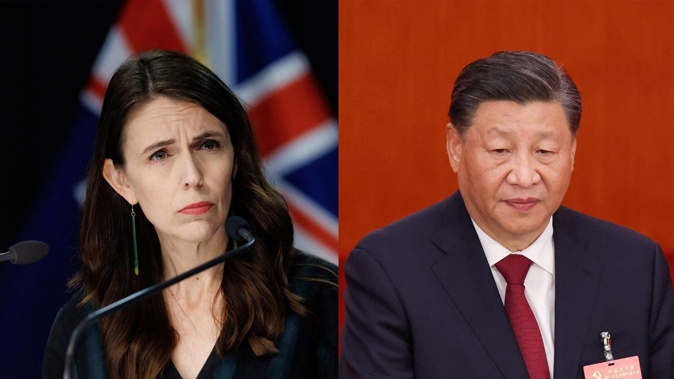
Prime Minister Jacinda Ardern has come away from a meeting with Chinese President Xi Jinping with an invitation to start working on dates for a visit to Beijing and having asked China to do what it could to resolve the conflict in Ukraine and North Korea’s use of ballistic missiles.
Ardern met with Xi at the Mandarin Oriental Hotel in Bangkok last night – a meeting that was scheduled to last 20 minutes but went for 50 minutes.
She said afterwards that it was a “constructive” meeting, and she had raised the long-standing concerns New Zealand had with China’s human rights – but the main topics of discussion were the issues of the day, including Russia and North Korea.
The meeting took place just hours after news North Korea had fired a ballistic missile into Japan’s waters, 200km off its coastline – sending Ardern into an urgent meeting with the Vice President of the US, Kamala Harris, and leaders of Japan, South Korea, Canada and Australia to discuss the issue.
In her opening remarks, Ardern said both countries benefited from a stable and secure region, and international laws and norms had served the region well. “But they are being tested now.”
Media were then moved out of the room by the China delegation before she could finish.
Ardern said afterwards she had encouraged China to use its influence and access to Russia and North Korea to help resolve regional and international security challenges.
Ardern would not say what Xi’s response had been to that, saying she did not want to speak on his behalf, but pointed to China’s overall policy on non-intervention in other countries’ affairs. “I simply made the case for why I think influence is important.”
“We are not claiming for a moment that whether it’s the war in Ukraine or the tensions we see with North Korea, that somehow China sits at the centre of that as a protagonist. Not at all.
“What we see though, is that China is a nation of influence. And in a situation where we are asking for everyone to use every lever they can to bring peace and stability to end the conflict, we will call on all those we believe have influence to use it for the peace and stability we need.”
China issues statement after Ardern meeting, says China wants ‘peace in the Pacific’
A statement issued by China after Xi’s meeting with Ardern repeated Xi’s opening remarks that “China regards New Zealand as an important partner and friend”.
“President Xi stressed that with different social systems, stages of development, histories and cultures, it is natural for China and New Zealand to have differences on some issues, but these differences should not be allowed to define or affect the bilateral relations.
“As comprehensive strategic partners, China and New Zealand should enhance communication and mutual trust, and accommodate each other’s core interests and major concerns to ensure that this relationship is sustainable and grows along the right path.”
The lengthy statement does not mention Ardern’s comment on Russia or North Korea, but does refer to the Pacific region and concerns about competition and rivalry in it.
“China has never sought hegemony in history; it is not doing that now, and will never do that in the future. China’s policy toward the Pacific Island countries is always aimed at pursuing peace, development and cooperation. China will work closely with New Zealand to promote peace, stability, development and prosperity in the Pacific Island region.”
It ended by saying New Zealand was “committed to stepping up communication and mutual understanding with China. New Zealand is ready to have in-depth exchanges with China on South Pacific affairs, and contribute to the prosperity and stability in the Asia-Pacific.”
In his opening remarks, Xi had described New Zealand as “an important partner and friend” and said the relationship aided peace and stability, and the partnership “should be taken to a higher level”.
In his translated opening comments, President Xi also said he “highly appreciated” Ardern’s commitment to New Zealand’s long-standing independent foreign policy – a position China has previously “reminded” New Zealand of when it has deemed it is too close to the United States on an issue. He said the China-NZ relationship had delivered benefits to both countries.
“You have said on multiple occasions that New Zealand is committed to an independent foreign policy and that China - New Zealand relations are one of the most important pairs of bilateral relationships involving New Zealand. And that the two sides need to conduct co-operation in areas of converging interests. I highly appreciate that.”
/cloudfront-ap-southeast-2.images.arcpublishing.com/nzme/H5ZSKDWDJFHTFJEIDODTEBATHI.jpg)
Prime Minister Jacinda Ardern (left) meets China President Xi Jinping in Bangkok. Photo / Thomas Manch, pool
Xi had noted it was the 50th year of China-New Zealand relations, and was one of “sound and steady growth.” “Co-operation has delivered benefits to our two people.”
Ardern said she had also raised the longer-standing concerns New Zealand had about China: Xinjiang, Hong Kong, the South China Sea and in more recent times, the Taiwan strait.
Ardern said they were issues New Zealand raised consistently and predictably, and China’s position was also consistent.
She said she didn’t necessarily expect such meetings to resolve major issues, but it was important to be able to have the conversations in a “respectful manner”. “I take heart from the fact we’ve been able to have a constructive conversation. We’ve spoken openly and frankly, and we’ve been able to take time.”
Security and the Covid-19 protocols around the meeting were tight. All those present had to have PCR tests ahead of it, N95 masks were required and hand sanitiser was sprayed on everybody entering the hotel.
It was Ardern’s first meeting in person with Xi since early 2019 when she travelled to Beijing - that was her first, and as yet only, visit to China since becoming PM in 2017.
The pair met soon after Xi had given a statement at the Apec summit, saying the Asia-Pacific region should not become “an arena for big power contest”.
“Unilateralism and protectionism should be rejected by all; any attempt to politicise and weaponise economic and trade relations should also be rejected by all,” Xi said.
/cloudfront-ap-southeast-2.images.arcpublishing.com/nzme/H5ZSKDWDJFHTFJEIDODTEBATHI.jpg)
PM Jacinda Ardern at a meeting on North Korea with leaders Australia PM Anthony Albanese (left), Canada PM Justin Trudeau, Japan PM Fumio Kishida, US Vice President Kamala Harris and South Korea PM Han Duck-soo. Photo / Thomas Manch, pool
“No attempt to wage a new cold war will ever be allowed by the people or by our times.”
The pair also met soon after Ardern was called in for an emergency meeting with US Vice President Kamala Harris and other leaders from Australia, Japan, Korea, and Canada to discuss the evolving situation in North Korea, after it fired a ballistic missile into Japan waters, about 200km from its coast.
In her remarks, Ardern said she condemned the actions - and expressed her concerns about the escalation by North Korea in launching missiles - and her commitment of the night before to South Korea’s Prime Minister that New Zealand would uphold sanctions on North Korea.
“I do want to particularly acknowledge the anxiety, the deep concern, the security threat, this escalation, this increasing use of missiles poses to Japan and South Korea.”
Harris said she had called the meeting so that the regional leaders could discuss “next steps”.
Take your Radio, Podcasts and Music with you








